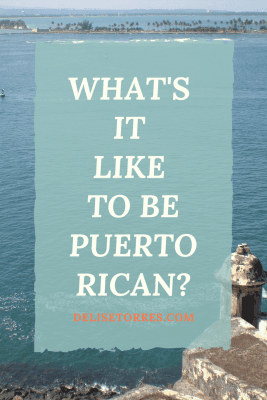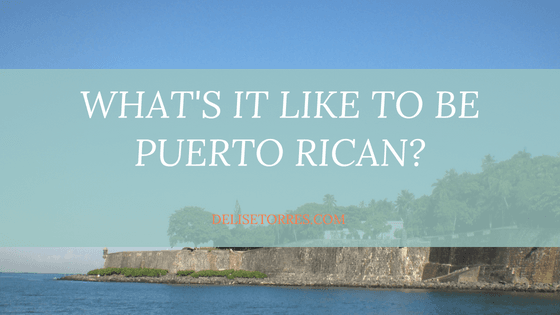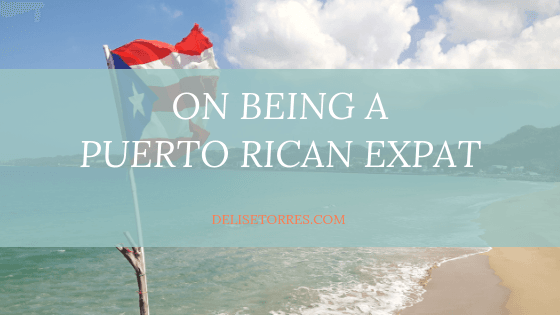Living in Germany for the past four years has taught me a lot about what it’s like to be Puerto Rican. Even though I haven’t lived on the island since 2007, the plantain stain, or mancha de plátano, is in me, no matter how much I try to hide it.
Many people don’t know much about Puerto Rico, yet we are everywhere. Here is a humorous look at who we are, based on my experiences living in the US and Germany.
We’re disappointed when people don’t know where we’re from
To us, Puerto Rico is the best place in the world, so naturally, we’re disappointed when we say, “I’m from Puerto Rico” and only get a glazed look in return. It is even more disappointing when the other person is from the US since Puerto Rico has been a US territory since 1898. The ones who do know have been there on vacation or know someone from Puerto Rico. I met a guy from the Philippines who knew that Ricky Martin and Jennifer Lopez are Puerto Rican, so that was nice.
Here in Germany, it’s even worse. The people only know that Puerto Rico is somewhere in the Caribbean or maybe in South America. They confuse it with Costa Rica all the time. It’s funny because Germans travel to Cuba and Dominican Republic a lot, yet have no idea Puerto Rico is right there, in the same area.
We’re always late
All Latin/warm countries seem to suffer from the same problem–we always arrive late. In Puerto Rico, people often arrive one to two hours late to a party. I’ve never been so late, but here in Germany, I’ve noticed how hard it is for me to be punctual, especially when German punctuality means arriving ten minutes early.
If you meet a Puerto Rican or any other Latin person, learn to live with it. We can’t help it.
We can make a party out of any situation
One of our comedians once poked fun at how Puerto Rican protests differ from US protests. In the US, protests are organized and tame. In Puerto Rico, someone will bring a drum and the slogan will be made into a song.
We have festivals for everything, from coffee to bananas, to kites and flowers, to chicken and fishing. Each of our 78 towns celebrates a yearly festival to their patron saint. Our Christmas season starts on Thanksgiving and lasts until the end of January.
Conclusion: If you want to party, Puerto Rico is the place to be.
We love to shop
Puerto Rico is a poor country, but you wouldn’t know it if you visit the malls. They are always full. A new store opens, and we are there. We have the largest shopping mall in the Caribbean, Plaza Las Américas. Enough said.
Puerto Rican food is not the healthiest
Puerto Rican food is delicious but it’s mostly all fried. We hardly eat vegetables except for the occasional salad. Our diet consists of rice, beans, and fried meat, with some fried plantains on the side.
Don’t plan on keeping your diet if you visit Puerto Rico.
Not all of us can salsa dance
Puerto Rico is the salsa capital of the world yet most Puerto Ricans don’t know how to salsa dance. They feel like they should take lessons. They don’t want to look foolish in front of other people.
I was one of these people, and it wasn’t until I moved to a small town in Germany where I finally learned Puerto Rican style salsa from a German couple. The irony.
Or know how to swim
Just because you live on an island surrounded by water, doesn’t mean you know how to swim. The beach is for sunbathing and then cooling off in the water when it gets too hot. It’s not for swimming. You’re supposed to stand in the water, look around and/or talk. It’s not a sporting event. It can be dangerous to swim.
This is why I still don’t know how to swim and may never learn. Here in Germany, it’s rare to find swimming lessons for adults since most everyone takes lessons when they’re children.
We don’t speak ‘correct’ Spanish
Puerto Rican Spanish is a mixture of our Indian Taino heritage, African heritage, and English. In Puerto Rico, an orange is not a naranja, but a china. Supposedly, Puerto Ricans gave it the name that was stamped on the bag they came from–China.
We use many English words like strawberries, parking, and truck, but pronounced, of course, a la Puerto Rican: estrawberries, palking, tro.
Other Latin countries make fun of our accent, but we don’t care.
We’ve already had a crash course in defensive driving
People in Puerto Rico break traffic rules all the time. They don’t use the signal when they want to change lanes. Slow vehicles travel in the left lane without moving over. Not everyone follows the speed limit. Cars that should be in junkyards travel the streets.
You have to keep your eyes open at all times and watch every car around you. The people driving may or may not have a driver’s license. If they do, it doesn’t necessarily mean they passed the test.
You’ve been warned.
Even if we make fun of our country we’ll always be proud
I love Puerto Rico and I miss it. It’s a unique land with a unique history. We’re part of Latin America but belong to the United States. Our education, government, and law systems stem from the US, yet our culture, music, and food match those of the rest of the Latin community.
We have economic issues and many of us have had to leave our country in order to make a better life for ourselves and our families. Yet Puerto Rico is a part of us, and we talk about everything it has to offer to everyone willing to listen.
Once you meet a Puerto Rican, you will learn about Puerto Rico and will always know where we’re from.
Are you Puerto Rican and have more to add or think I’m off base? Let me know in the comments below. And if you’ve met a Puerto Rican or visited Puerto Rico, does any of this resonate with you? I’d love to hear your anecdotes.










23 Responses
I am half Puerto Rican on my mother’s side . We have a big extended family and we got together almost every weekend. We just really liked being together. Cooking and eating a big meal was standard, but once in a while, we’d stray from the Puerto Rican food and do something different, like a luau. Of course, all the women wore muumuus! When we got together at my abuela’s apartment in Manhattan, after a big meal, they would push the furniture out of the way, roll up the rug, and put on the music and dance! I have photos of the great aunts and uncles each dancing around with one of us in their arms. No wonder that I grew up with a passion for dancing!
Sounds cool! Thanks for sharing!
I’m 100 percent Boriqua, but let’s be honest. We’re as ghetto as they come. No comparison to anyone in this world. We’re the loudest people in the room. We speak slang by default. We fear nothing. And we make every American city respect our side of the city. I live in North Philly now, we’re an unmatched breed. My cousins live in South Bronx. Ponce ala muerte though. Wepa!!!
Ha, ha! Yo soy boricua, pa que tú lo sepas!
My mother was living on the mainland on Delancey street . All her sisters lived in the same building . When mom was pregnant with me just before I was due she flew to the island so that I would be born there . Three years later she did the same with my brother . As an adult years later I asked her why – and she smiled as she put on some boleros and replied so you never forget that you are boricua.
I love this story! Thank you so much for sharing!
I born and grew up in Puerto Rico, there is a misconception about being “always late” .. that’s more of a metro area behavior, americanized basically. I grew up in El Campo, getting up very early and be at least 30 minutes early was what we were told. Being late was and is very disrespectful for people that resides in Campos. Keep in mind majority of these families are/were farmers .. farmers are NEVER late and are very respectful of people’s time
That’s a good point! Thank you for sharing!
Thank you for this story! I absolutely loved reading it chuckled to myself all the way through it! I was born in El Barrio of Manhattan, or East Harlem as it is commonly known, but my parents are both Guayama born. Of my 6 siblings, only one was born there and when growing up, I spoke terrible Spanish because my father said: Here in America, you speak English! He felt that if we couldn’t express ourselves in perfect English, we would be disrespected all our lives. I am one of those Boriquas that went to 4 years of Salsa classes, too! By the way, I’ve been married to a German American for the last 44 years, and he love Puerto Rico, our history and especially our food and I, in turn love German food almost as much! Keep up the good work and maybe you can recommend some places to visit this Summer, when my sister, my German born Puerto Rican cousins and I visit Germany in August!
Thank you so much for this comment! I’m glad you enjoyed the article. And how cool that you’re also tied to Germany. Contact me and I’ll give you some recommendations on where to go!
Hola Delise….regards to your Family,
BRAVO y OLE!!!!! Not only are you intelligent, but you are also brilliant. Keep doing it….so far, so very good.
I have good memories of Germany, from my stay for two years with the US ARMY ( 1955-56). Stationed in a small town, by the name of Kirch Goens, close by Butzback and Gueisen….about an hour by train to Frankfurt. Also, I spent nine weeks attending an Advance Ordinance School in FUSSEN, close by Garmish, a fabulous winter sports center. On September 28, 1955, the Professor was handed a note: “We are experiencing the first snowfall of the season, let’s go out and share it”. – School Director. It was my first encounter with snow, and I did not know what to do in front of my schoolmates.
Only two things, I didn’t get along with….weather and language.
Everything else was absolutely GREAT!!!! Traveled to different Countries, including Christmas 1955 in SPAIN ….
SUERTE y MUCHO EXITO….con tiempo para disfrutarlo junto a los tuyos,
José Antonio Palacios-Aponte
SAMARITANO de San Lorenzo
Thank you so much! I’ve lived in Germany for almost 11 years and the weather is still difficult for me to deal with.
When drafted into the Army nov9Maryland 1962, I’m now 84, was sent Ft Meade Maryland, when we were in formation in the morning, the mayoritary of the group were from Puerto R all of a sudden began t o snow, the and the unexpected just happened, we began breaking formation and started running around like kids. The platoon Sgt was dumbfounded could not understand what was happening, and I remember he asked a squad leader about that behavior, his response, in Puerto Rico does not snow and this the first time they see snow!
Hahaha! Thank you for sharing!
That was a fun read. I also grew up in PR but have been long gone. I think it’s been 20 years since I last visited. In your 11 years in Germany, have you managed to become fluent in German, good accent and all? I have been learning German for a little while but because no one around me speaks the language my progress has been very slow which means that my conversational skills are rudimentary at best. And then I also find it physiologically difficult and exhausting to enunciate correctly (or as close to correctly as I ever can). Some consonants are harder than others and much depends on what comes immediately before and immediately after. Then there is the grammar and noun genders (so much is contingent on them!), for which I have to often stop, think and formulate and that, by the time I am done and ready to say my piece, the topic has already changed! I am contemplating a move there but don’t know if I could survive with my German language skills at the level they currently are. And yes, I am very aware that most Germans speak English and would rather converse in English than hear anyone struggle with their language (-: I have visited Germany many times so I am very familiar with the country in general (and aware of so many regional cultural differences, dialects, etc). In any case, appreciate learning about your journey with the German language.
I can communicate fluently, but still make grammatic mistakes, sometimes forget a word, and my enunciation is not perfect. People understand my meaning and sometimes complete the sentence for me when they see that I struggle. My experience has been that most Germans are reluctant to speak in English (they don’t think they can speak it well) and appreciate when someone speaks the language even if it’s not perfect. Everyone has been very nice about it. So I wouldn’t let the language issue deter you from moving to Germany. Once you’re here, it’ll be easier to learn and you’ll be able to practice more. To get a visa to live here you’ll need at least A1 German proficiency. You can find samples of the tests online from the Goethe Institute to give you an idea if you’re at this level or not. I also used the resources from the Deutsche Welle, which has exercises for each level. Good luck to you!
Thank you and appreciate reading about your experience with the language and the tips you gave. Will have to see what the future brings, if I can ever muster the courage to make the move. Best wishes to you as well.
Thank you!
I loved this article and the comments so much. I’m one of the many Puerto Rican’s that was raised without the culture or the language. I happened upon this, as I’m going for the first time this spring. My dad left the island and was put into a “home” in NY. It was there that the language and the culture was ripped from him. It’s still too painful at 75 for him to try and speak the language or talk about his memories. From a little girl I was curious and felt deeply connected to the language, the music, the dancing. I carry so much shame about not being Puerto Rican enough, however I have finally gathered enough courage to visit PR. Rather, my husband planned a trip for my 40th birthday. I desperately want to know what it’s like and yet I know I can never replace or recreate what I’ve lost. My hope is to feel more connected to something that’s been missing all of my life and show my children a small piece of their history. Thank you for sharing.
Thank you for your comment! I’m so sorry about what happened to your father and for the shame you feel. Puerto Ricans are very friendly and welcoming, so I’m sure you’ll fit right in. I hope you enjoy your trip and reconnect with your roots, and that it brings you healing and maybe a fresh start. Take care!
Thank you!
I’m Boricua on both sides of my family but I was born and raised in Orlando, and I always wanted to visit the island. I just really wanted to learn more about my people.
Thank you for reading! You should definitely visit someday and experience the island up close. If you want to learn more, check out my other articles about Puerto Rico.